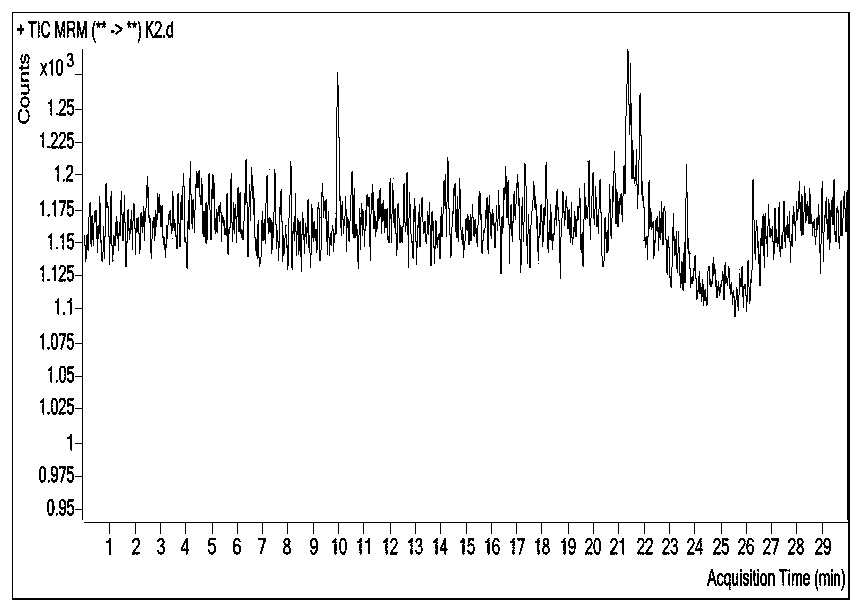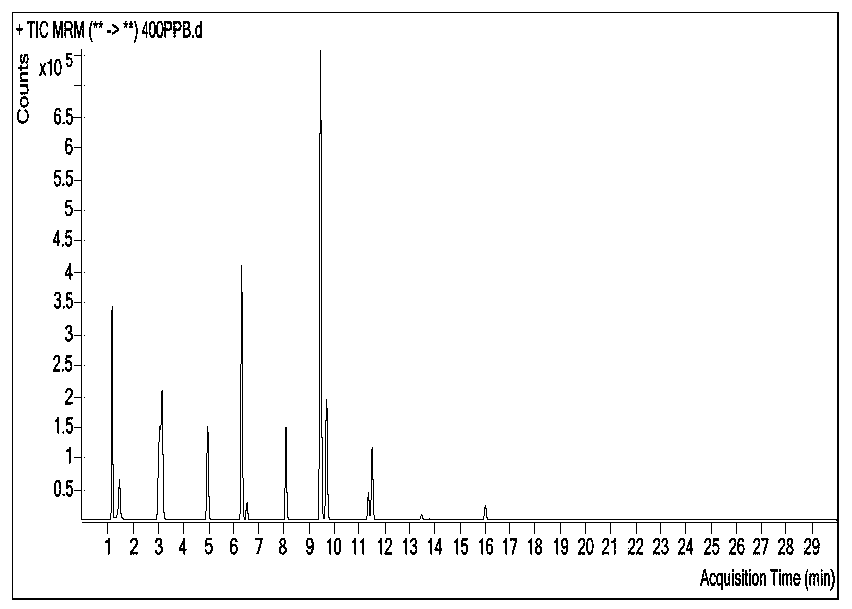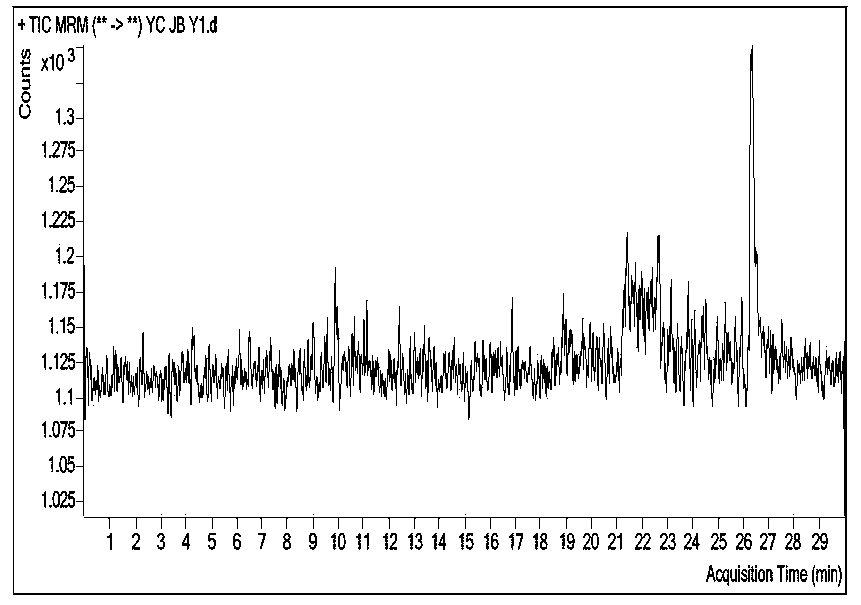Method for detecting 11 organophosphorus pesticide residues in radix paeoniae alba by ultra-high performance liquid chromatography-mass spectrometry
An organophosphorus pesticide and ultra-high performance liquid phase technology, which is applied in the field of chemical analysis and detection, can solve the problems of prone to false positive results, long growth cycle of white peony root, limited application range, etc., and achieve low detection limit and high accuracy High, high-sensitivity effects
- Summary
- Abstract
- Description
- Claims
- Application Information
AI Technical Summary
Problems solved by technology
Method used
Image
Examples
Embodiment 1
[0074] Embodiment 1: the investigation of specificity
[0075] Preparation of 11 kinds of organophosphorus pesticide stock solutions: Weigh 10 mg of each of the 11 kinds of organophosphorus pesticide standard substances and place them in a 10mL volumetric flask, dissolve them with acetone and set the volume to the mark, so that the concentrations of the 11 kinds of pesticide standard substance stock solutions are 1000μg / mL, the pesticide standard stock solution is stored at -18°C;
[0076] Preparation of 1 μg / mL mixed reference solution: take 100 μL of each of the above 1000 μg / mL, and dilute to 10 mL with acetone to obtain a 10 μg / mL mixed standard solution; take 1 mL of 10 μg / mL mixed standard solution, add acetonitrile to dilute to 10mL to obtain a 1μg / mL mixed standard solution, see Attached Table 1 for details;
[0077] Preparation of 400ng / mL mixed reference substance solution: Take 400μL of the above 1μg / mL mixed reference substance solution, add acetonitrile to dissol...
Embodiment 2
[0089] Embodiment 2: the investigation of injection volume
[0090] Preparation of 11 kinds of organophosphorus pesticide stock solutions: Weigh 10 mg of each of the 11 kinds of organophosphorus pesticide standard substances and place them in a 10mL volumetric flask, dissolve them with acetone and set the volume to the mark, so that the concentrations of the 11 kinds of pesticide standard substance stock solutions are 1000μg / mL, the pesticide standard stock solution is stored at -18°C;
[0091] Preparation of 1 μg / mL mixed standard solution: take 100 μL of each of the above 1000 μg / mL, dilute to 10 mL with acetone to obtain a 10 μg / mL mixed standard solution; take 1 mL of 10 μg / mL mixed standard solution, add acetonitrile to dilute to 10mL to obtain a 1μg / mL mixed standard solution, see Attached Table 1 for details;
[0092] Preparation of 50ng / mL mixed standard solution: take 50μL of the above 1μg / mL, add acetonitrile to 1mL, and obtain 50ng / mL mixed standard solution;
[0...
Embodiment 3
[0097] Embodiment 3: the investigation of purifying filler
[0098] Preparation of 11 kinds of organophosphorus pesticide stock solutions: Weigh 10 mg of each of the 11 kinds of organophosphorus pesticide standard substances and place them in a 10mL volumetric flask, dissolve them with acetone and set the volume to the mark, so that the concentrations of the 11 kinds of pesticide standard substance stock solutions are 1000μg / mL, the pesticide standard stock solution is stored at -18°C;
[0099] Preparation of 1 μg / mL mixed standard solution: take 100 μL of each of the above 1000 μg / mL, dilute to 10 mL with acetone to obtain a 10 μg / mL mixed standard solution; take 1 mL of 10 μg / mL mixed standard solution, add acetonitrile to dilute to 10mL to obtain a 1μg / mL mixed standard solution, see Attached Table 1 for details;
[0100] Chromatographic conditions: Chromatographic column: Proshell HPH-C18 2.7μm 3x100mm; mobile phase: acetonitrile-0.1% formic acid (containing 10mmol / L ammo...
PUM
| Property | Measurement | Unit |
|---|---|---|
| recovery rate | aaaaa | aaaaa |
| recovery rate | aaaaa | aaaaa |
Abstract
Description
Claims
Application Information
 Login to View More
Login to View More - R&D
- Intellectual Property
- Life Sciences
- Materials
- Tech Scout
- Unparalleled Data Quality
- Higher Quality Content
- 60% Fewer Hallucinations
Browse by: Latest US Patents, China's latest patents, Technical Efficacy Thesaurus, Application Domain, Technology Topic, Popular Technical Reports.
© 2025 PatSnap. All rights reserved.Legal|Privacy policy|Modern Slavery Act Transparency Statement|Sitemap|About US| Contact US: help@patsnap.com



